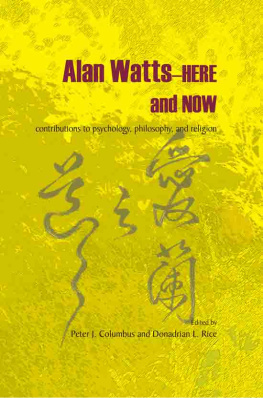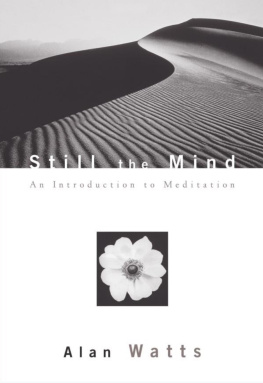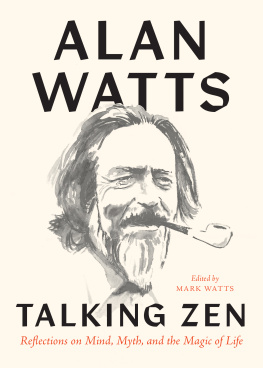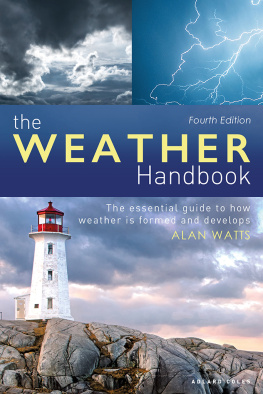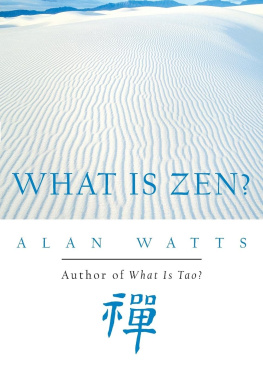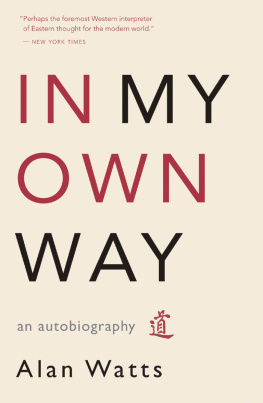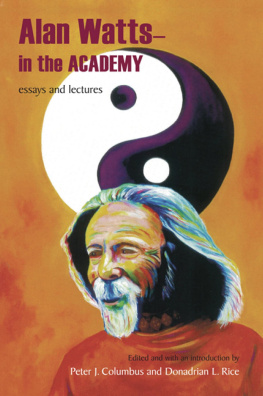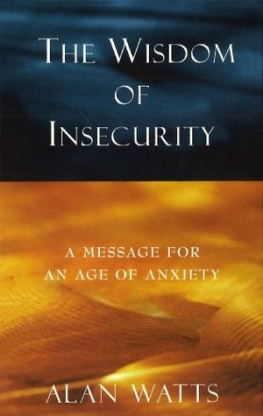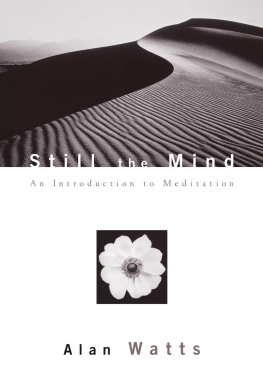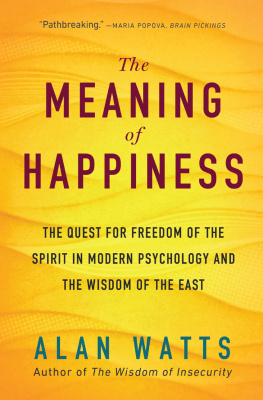SUNY SERIES IN TRANSPERSONAL AND HUMANISTIC PSYCHOLOGY
Richard D. Mann, editor
Alan Watts HERE
and NOW
contributions to psychology, philosophy, and religion

Edited by
Peter J. Columbus and Donadrian L. Rice
state university of new york press
Published by
STATE UNIVERSITY OF NEW YORK PRESS
Albany
2012 State University of New York
All rights reserved
Printed in the United States of America
No part of this book may be used or reproduced in any manner whatsoever without written permission. No part of this book may be stored in a retrieval system or transmitted in any form or by any means including electronic, electrostatic, magnetic tape, mechanical, photocopying, recording, or otherwise without the prior permission in writing of the publisher.
For information, contact
State University of New York Press
www.sunypress.edu
Production and book design, Laurie Searl
Marketing, Anne M. Valentine
Library of Congress Cataloging-in-Publication Data
Alan Wattshere and now : contributions to psychology, philosophy, and religion / edited by Peter J. Columbus and Donadrian L. Rice.
p. cm. (SUNY series in transpersonal and humanistic psychology)
Includes bibliographical references and index.
ISBN 978-1-4384-4199-3 (hardcover : alk. paper) 1. Watts, Alan, 1915-1973. I. Columbus, Peter J. II. Rice, Donadrian L.
B945.W324A65 2012
191dc23
2011021791
10 9 8 7 6 5 4 3 2 1
Acknowledgments
The inspiration and idea for this book came to light in the sacred clearing that is the Unitarian Universalist Rowe Conference Center in Rowe, Massachusetts. Sincere appreciation to Rev. Douglas Wilson, Pru Berry, Felicity Pickett, and the staff of the Rowe Center for maintaining a remarkable sanctuary.
Infinite gratitude goes to our contributors and their readiness to write substantive chapters in the midst of already hectic schedules.
The book was edited in several locales: The psychology departments at Union College (Kentucky) and University of West Georgia; Sandra Cohen's New York estate; and Jean-Claude van Itallie's Shantigar estate in Rowe, Massachusetts. Thanks to all for their kindness, generosity, and benefaction.
Thanks also to Dr. Jeffrey J. Kripal, an anonymous reviewer, and the editing staff at SUNY Press for helping to make a more perfect book; to Susan Mann for her troubleshooting and encouragement, and to Kevin Kent for his careful and astute attention to the process of indexing.
We are grateful to Chungliang Al Huang who kindly shared his calligraphic artwork.
Illustrations
Introduction: A New Look at Alan Watts
Peter J. Columbus and Donadrian L. Rice
I am committed to the view that the whole point and joy of human life is to integrate the spiritual with the material, the mystical with the sensuous, and the altruistic with a kind of proper self-lovesince it is written that you must love your neighbor as yourself.
T his book is a call to remembrance and an opportunity for reconsidering the life and work of Alan Watts. Writing a mere fifteen years after Watts' untimely demise, November 2008 signified the thirty-fifth anniversary of Watts' death, and this benchmark date served as inspiration for making a new study of his scholarship. The chapters compiled in this volume reconsider Watts' insights on the human condition in light of today's discourse in psychology, philosophy, and religion.
A hint of Watts' contemporary relevance may be found at the beginning of his essay on Wealth versus Money. He wrote: In the year of our lord Jesus Christ 2000, the United States of America will no longer exist (). The previous sentence strikes a rather prescient tone given so-called post-9/11 sensibilities. Watts was reflecting on modern-day obsessions with abstract monetary riches acquired at the expense of personal, social, and environmental well-being. He wrote also of waning natural resources, nuclear arms proliferation, biological and chemical warfare, and maniacal misapplications of technology. Nowadays, there are new variations on old themes: preemptive wars, terrorism, torture, ethnic cleansing, food and fuel shortages, catastrophic oil spills, and global climate change. Each is pushing human civilization toward the brink of disaster. Yet, Watts always offered his audiences propitious and uplifting insights on what it means to be human. He continually broached the possibility that greed, anger, and ignorance could be transformed, as Buddhists often suggest, into wisdom, compassion, and enlightenment. If it is true in the new millennium as it was during Watts' own day, that humanity is facing what Martin Luther King called the fierce urgency of now as some contemporary voices would imply, then all the more compelling reason to consider Alan Watts anew.
CURRICULUM VITAE
Alan Watts' resume is impressive. It reflects the depth, breadth, and variety of accomplishment afforded by his fifty-eight years of living. He was born on January 6, 1915, in Chislehurst, England, and graduated from the prestigious King's School on the grounds of Canterbury Cathedral in 1932. Eschewing a traditional undergraduate education in favor of tutorials on Buddhism with Zen scholar Christmas Humphreys, Watts eventually enrolled at Seabury-Western Theological Seminary where he was ordained an Episcopal priest in 1944 and awarded an S.T.M. in 1948. He served upon ordination as examining chaplain for the bishop of Chicago and as chaplain at Northwestern University until leaving the Episcopal Church in 1950. Watts subsequently held a professorship in comparative philosophy and psychology at the College of the Pacific's American Academy of Asian Studies (19511957), where he also served a stint as dean of the academy (19531956). In 1958, the University of Vermont bestowed an honorary doctorate of divinity for his learned offerings to the field of comparative religion. Watts then spent the remainder of his life as an independent scholar and freelance philosopher.
Watts served as editor of Buddhism in England (19361938; now The Middle Way), and co-edited (with L. Cranmer-Byng) the Wisdom of the East series (19371941). In later years he edited the Patterns of Myth series (1963a), ).
Watts' middle works, from 1941 to the late 1950s, exuded greater originality and sophistication for academic audiences as he was situated variously at Seabury-Western Seminary, Northwestern University, and the American Academy of Asian Studies. ).
By the end of the 1950s, however, Watts saw a need for academic specialists to communicate with the myriads of literate nonscholars who increasingly constitute our world ().
Watts was awarded research grants by the Franklin J. Matchette Foundation in 1950 and the Bollingen Foundation in 19511953 and 19621964. He was a research fellow at Harvard University in 19621964, visiting scholar at San Jose State University in 1968, research consultant at Maryland Psychiatric Research Center in 1969, and guest lectured at leading universities and medical schools worldwide, including Stanford, Berkeley, Chicago, Yale, Cornell, Cambridge, and the C. G. Jung Institute in Zurich. Watts offered a weekly program on Pacifica Radio originating at KPFA-FM in San Francisco and broadcast nationwide, filmed a twenty-six-part series entitled Eastern Wisdom for Modern Life for National Educational Television, and narrated award-winning films on Zen Buddhism for the Hartley Film Foundation. He was a member of the American Oriental Society, a board member of the Foundation for Mind Research, sat on the Executive Council of the World Congress of Faiths, was founder and president of the Society for Comparative Philosophy, and established the

